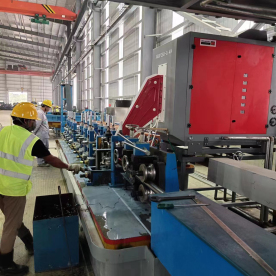[Multi-functional tube making machine]Revolutionizing Manufacturing: The Impact of Multi-Functional Tube Making Machines on Industry Efficiency and Product Quality
News 2024-10-3
In today's rapidly evolving manufacturing landscape, the need for flexibility, efficiency, and quality in production processes has never been more paramount. Multi-functional tube making machines are at the forefront of this revolution, offering a versatile solution for various industries ranging from automotive and aerospace to medical and consumer goods. These machines not only streamline production but also enhance the quality and precision of the tubes produced, catering to the diverse needs of modern manufacturing.
**What is a Multi-Functional Tube Making Machine?**
A multi-functional tube making machine is an advanced piece of equipment designed to produce tubes and pipes of various materials, sizes, and specifications. Unlike traditional tube making machines that are limited to one material or geometry, these machines can handle multiple materials, including metals, plastics, and composites, making them ideal for manufacturers looking to optimize their production lines. They often feature programmable controls, allowing for automated adjustments in dimensions, shapes, and other parameters, enhancing both versatility and efficiency.
**Key Features of Multi-Functional Tube Making Machines**
1. **Versatility in Production**: One of the most significant advantages of multi-functional tube making machines is their ability to produce a wide range of tube types. From round and square tubes to specialized shapes, they can accommodate varying production requirements. This capability allows manufacturers to transition easily from one product to another without the need for extensive retooling.
2. **Enhanced Precision and Quality**: Modern multi-functional tube making machines are equipped with cutting-edge technology that ensures high levels of precision in tube production. Features such as laser cutting, automatic welding, and real-time monitoring systems help maintain stringent quality control, reducing the likelihood of defects and ensuring that the final product meets exact specifications.
3. **Efficiency in Production**: With automated processes and reduced manual intervention, multi-functional tube making machines significantly enhance production efficiency. They can operate at higher speeds while maintaining consistent quality. Moreover, these machines can often run continuously with minimal downtime, which is crucial for meeting the demands of high-volume production.
4. **Material Compatibility**: Multi-functional machines are designed to work with various materials, providing manufacturers with the flexibility to choose the best material for their specific application. This adaptability can lead to cost savings and improved product performance, as manufacturers can select more suitable materials without investing in separate machines for each type.
5. **Smart Technology Integration**: Many multi-functional tube making machines come equipped with smart technology that allows for data collection and analysis. This feature enables manufacturers to monitor production in real time, optimize processes, and predict maintenance needs, ultimately leading to enhanced operational efficiency and reduced costs.
**Applications Across Industries**

Revolutionizing Manufacturing: The Impact of Multi-Functional Tube Making Machines on Industry Efficiency and Product Quality
**Environmental Considerations**
With growing awareness of environmental sustainability, many manufacturers are seeking ways to minimize waste and energy consumption. Multi-functional tube making machines contribute to these efforts by optimizing material usage and reducing scrap rates. Additionally, their ability to easily switch between materials facilitates the use of more sustainable options, such as recyclable plastics, further aligning production processes with environmental goals.

Revolutionizing Manufacturing: The Impact of Multi-Functional Tube Making Machines on Industry Efficiency and Product Quality

